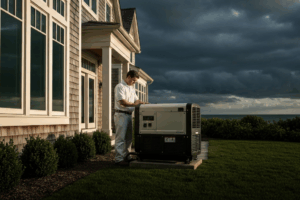
Job Market for Electricians in Seattle and Spokane
Seattle’s High-Voltage Market: A Hub for Commercial and Specialized Electricians
The job market for electricians in Seattle is a direct reflection of its status as a global technology and commercial hub. The constant construction of high-rise offices, expansive data centers, and mixed-use developments keeps the demand for a skilled commercial electrician exceptionally high. These large-scale projects require not only general electrical expertise but also a range of specialized skills, creating lucrative niches for qualified professionals.
Key Sectors Driving Demand in Seattle
- Data Centers: As the backbone of the tech economy, data centers are a primary driver of electrical work. These facilities have immense and complex power needs, from high-capacity distribution systems to redundant backup power. Electricians with expertise in industrial controls and egress requirements for complex facilities are in high demand. For those working in this space, understanding how recent code updates impact egress in specialized environments is critical, as detailed in discussions on how 2023 NEC updates have changed modular data center egress requirements.
- Commercial and Residential Construction: The Seattle skyline is in a state of perpetual transformation. This translates to consistent work for the (01) general journey-level electrician and the (02) residential electrician on projects ranging from new skyscrapers to multifamily housing complexes.
- Marine and Port Electrification: Seattle’s maritime industry creates unique opportunities for a marine electrician. The work involves everything from wiring container cranes and refrigerated units to servicing the complex electrical systems on vessels, requiring a specialized skillset to handle harsh saltwater environments.
In-Demand Specialties
In Seattle, specialization is key to commanding a higher salary. A PLC programmer who can automate industrial processes is invaluable in the region’s manufacturing and logistics sectors. Likewise, the need for a low voltage electrician and fire alarm technician is soaring as buildings become smarter and more connected, requiring intricate networks for data, security, and life safety systems. The (06) limited energy electrician license is becoming increasingly vital in this space.
Spokane’s Steady Growth: Diverse Opportunities in the Inland Northwest
Across the state, the Spokane market offers a different but equally compelling landscape. While the salary headlines may not always match Seattle’s, Spokane’s lower cost of living and steady, diversified growth make it a highly attractive place for electricians to build a career. The market is characterized by robust development in healthcare, education, and light industrial sectors. Major infrastructure projects, including road work and utility upgrades, are also planned for 2025 and beyond, ensuring a pipeline of work for skilled trades.
Key Sectors Driving Demand in Spokane
- Healthcare and Education: Spokane is a regional medical hub, and ongoing expansions of hospitals and university campuses create consistent demand for electricians. These projects require strict adherence to code for critical life-safety and backup power systems.
- Light Industrial and Manufacturing: The Spokane area has a growing light industrial and manufacturing base. This creates a need for the industrial electrician skilled in motor controls, machinery maintenance, and three-phase power systems.
- Residential Development: As Spokane’s population grows, so does the need for housing. A licensed residential electrician will find ample opportunities in new subdivisions and the renovation of existing homes.
Statewide Trends Shaping the Future of Washington Electrician Jobs
Beyond the specific dynamics of Seattle and Spokane, several powerful trends are shaping opportunities for every electrical contractor and tradesperson in the state.
The most significant of these is the green energy transition. Washington’s commitment to sustainability is supercharging demand for electricians skilled in renewable technologies. According to the Solar Energy Industries Association, the solar power industry is projected to add 1,808 MW of capacity in Washington over the next five years. The hybrid and electric vehicle markets are expanding rapidly. This translates directly into jobs installing solar panels and EV charging stations. Understanding the latest NEC rules around these installations is no longer a niche skill but a core competency, making resources that explain how 2023 NEC rules are changing EV charger installation requirements essential for staying competitive.
This evolving landscape underscores the importance of proper training and licensing. Whether you’re starting at an electrician school, getting certified through a program like NCCER, or are a seasoned pro, continuous learning is non-negotiable. Holding a valid Washington state electrical license is the first step, but specializing and staying current with code is what secures long-term career success.
Positioning Yourself for Success in Washington’s Electrical Market
The job outlook for electricians in Washington is bright, but the best opportunities will go to those who are prepared. Here’s how to position yourself at the forefront:
- Commit to Continuous Learning: The electrical field is never static. New technologies, materials, and code cycles demand a commitment to education. Engaging with online electrical courses is an efficient way to stay current on everything from safety protocols to new technologies. A deep understanding of code changes is paramount, and every professional should regularly review materials that cover how the 2023 NEC improves electrical worker safety.
- Pursue Specializations: While a general journey-level license provides a strong foundation, developing a specialty in a high-demand area like industrial automation, fire alarms, or renewable energy can significantly increase your earning potential.
- Advance Your License: Charting a path from an apprentice or Journeyman electrician to a master electrician or even an independent electrical contractor opens up new levels of responsibility and income.
From the high-tech boom in Seattle to the steady, diversified growth in Spokane, the demand for qualified electricians in Washington is undeniable. By investing in your skills, embracing new technologies, and maintaining a deep understanding of the electrical code, you can build a resilient and rewarding career in the Evergreen State. Ready to power up your professional development? Browse our courses to find state-approved training that will keep you ahead of the curve.
Disclaimer: The information provided in this educational content has been prepared with care to reflect current regulatory requirements for continuing education. However, licensing rules and regulations can vary by state and are subject to change. While we strive for accuracy, ExpertCE cannot guarantee that all details are complete or up to date at the time of reading. For the most current and authoritative information, always refer directly to your state’s official licensing board or regulatory agency.



